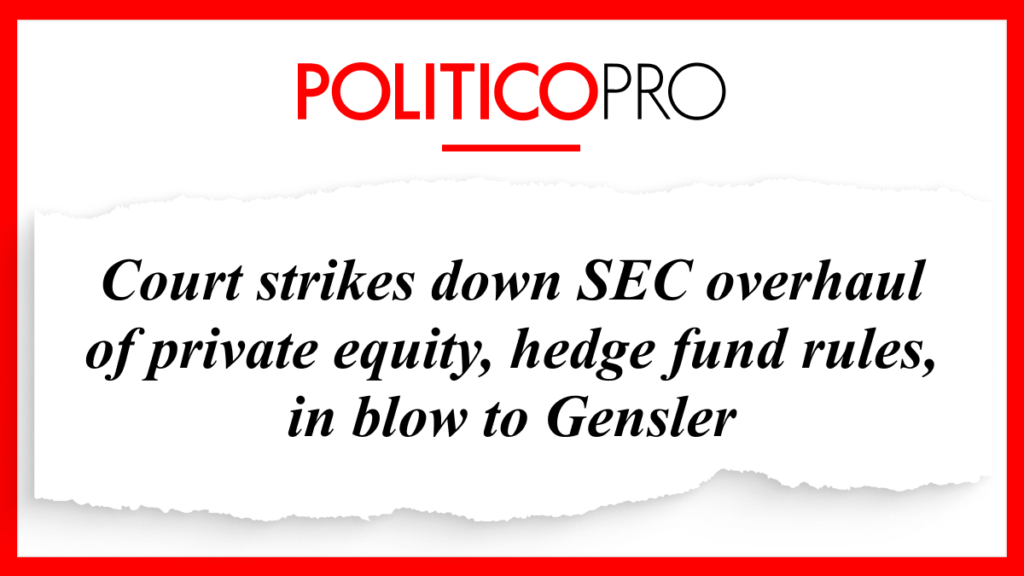ICYMI / Politico: Court strikes down SEC overhaul of private equity, hedge fund rules, in blow to Gensler
“A federal appeals court on Wednesday struck down a sweeping overhaul of rules governing private equity firms and hedge funds, a big win for Wall Street groups pushing back against SEC Chair Gary Gensler’s agenda.”

Today, POLITICO published an article highlighting the 5th U.S. Circuit Court of Appeals’ decision to strike down a proposed set of rules from the Securities and Exchange Commission (SEC) that would have added unnecessary burdens to the thousands of businesses that depend on private equity and credit across America.
The American Investment Council (AIC) was proud to join five other industry groups in this successful lawsuit to push back on harmful overreach from the SEC.
“In rejecting the SEC’s unfounded legal theory, the court has sent Washington regulators a strong message that they cannot bypass Congress when pushing their extreme agenda,”said AIC President and CEO Drew Maloney in a statement to POLITICO.
Read the full POLITICO article below:
Court strikes down SEC overhaul of private equity, hedge fund rules, in blow to Gensler
By Declan Harty | June 5, 2024
A federal appeals court on Wednesday struck down a sweeping overhaul of rules governing private equity firms and hedge funds, a big win for Wall Street groups pushing back against SEC Chair Gary Gensler’s agenda.
The SEC exceeded its statutory authority last year when it finalized a slate of new rules for the more than $30 trillion private fund industry, a three-judge panel in the New Orleans-based Fifth Circuit Court of Appeals ruled. The judges said that part of a post-financial-crisis reform that the SEC had relied on in the final rule did not apply to the powerful universe of private equity, hedge funds and venture capital.
“The ruling is a victory for thousands of businesses across America that need capital to grow and millions of workers who depend on private equity and credit to strengthen their retirements,” said American Investment Council CEO Drew Maloney, whose group was one of the several that sued over the rule last year, in a statement. “In rejecting the SEC’s unfounded legal theory, the court has sent Washington regulators a strong message that they cannot bypass Congress when pushing their extreme agenda.”
An SEC spokesperson said the agency was reviewing the decision and “will determine next steps as appropriate.”
The decision threatens one of the most ambitious plans enacted by Gensler’s SEC — underscoring the danger looming in the courts for President Joe Biden’s other corporate watchdogs. The rules would have imposed new reporting requirements on the secretive funds in a bid to strengthen investor protection, shaking up an industry that has fiercely opposed stricter SEC oversight.
Gensler’s agency has been the target of Wall Street’s ire for years. Yet in the last six months, trade groups and financial firms have escalated their court challenges to SEC regulations, charging that the agency is exceeding its authority and violating proper procedure.
The SEC has already had one rule knocked down by the courts and is defending a slate of other efforts related to climate risk disclosures, bringing high-speed trading firms under its authority and the funding of a massive stock trading database. Now, the agency’s revamped rules for the private funds universe — a pillar of Gensler’s rulemaking vision — are on the chopping block.
The SEC’s private fund rules were designed to shed new light on the growing private fund industry, which has taken over a massive swath of the global economy over the last decade. The rules would give greater power to pension funds, endowments and other institutions in their dealings with the funds, the SEC says. When the rules were finalized in August, Gensler said they would also “help promote greater competition and thereby efficiency in this important part of the market.”
But leading private equity and hedge fund groups argued that the regulations were an unnecessary upheaval to the industry and they filed suit. Among those involved in the litigation were the Managed Funds Association, the American Investment Council and the National Association of Private Fund Managers — all of which were represented by former Labor Secretary Eugene Scalia, a prominent administrative law litigator and the son of the late Supreme Court justice.
In the lawsuit, the Wall Street groups said the SEC was venturing outside its jurisdiction by justifying the rule with authority that was granted to the agency under the Dodd-Frank Act. The SEC said the powers allow it to dial up its oversight of private fund advisers and their interactions with investors, but the industry argued that the law’s provision was intended for individual investors.
They also had claimed that the SEC was looking to prohibit certain practices in the industry, such as specially tailored agreements between advisers and investors.
The Fifth Circuit panel agreed with the industry on the SEC operating outside its authority. In a 25-page opinion, the judges wrote that the section of Dodd-Frank that the SEC relied on in the final rule “has nothing to do with private funds,” the panel wrote.
Wall Street was quick to cheer the decision. In a statement, MFA CEO Bryan Corbett called it a “significant victory for markets, fund managers, and investors, including pensions, foundations, and endowments.” MFA represents leading hedge funds including GOP megadonor Ken Griffin’s Citadel, Bridgewater Associates and Elliott Investment Management.
But Healthy Markets Association CEO Tyler Gellasch, whose group represents institutional investors, warned that the ruling will exacerbate concerns about a market where large investors get more information and better deals, leaving others to “take whatever they get.”
“While the federal securities laws were created to ensure investors were provided with essential information, the court is saying the SEC can’t do that for investors in private funds,” Gellasch said. “The decision makes it clear that investors can’t rely on the SEC or the courts to protect them from private fund abuses.”


